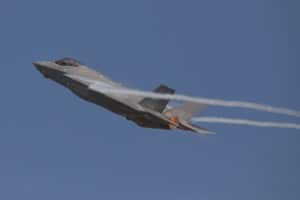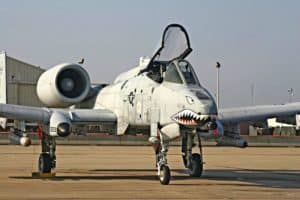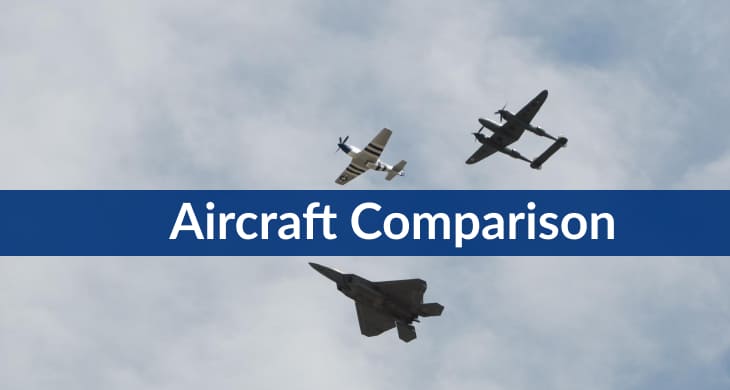The F-35 and A-10 are both fighter jets that the United States military has used. They are both highly advanced aircraft but have different strengths and weaknesses. Some argue that the F-35 is a better jet, while others believe the A-10 is superior.
| Aircraft: | Lockheed Martin F-35 Lightning II | Fairchild Republic A-10 Warthog |
|---|---|---|
| Photo: |
 |
 |
| Country: | United States | United States |
| Manufactured: | from: 2011 to: Present | from: 1972 to: 1984 |
| ICAO: | F35 | A10 |
| Price: | $115.5 million | $18.8 million |
| Avionics: | JSF Cooperative Avionics | AN/AAS-35(V) Pave Penny Laser Track Pod , HUD |
| Engine: | 1x Pratt & Whitney F135-PW-100 | 2x General Electric TF34-GE-100A |
| Engine Type: | Turbofan | Turbofan |
| Power: | 43,000 pound-force | 9,065 pound-force |
| Max Cruise Speed: |
1043 knots 1,932 Km/h |
400 knots 741 Km/h |
| Approach Speed (Vref): | 250 knots | - |
| Travel Range: |
1,500 Nautical Miles
2,778 Kilometers |
2,240 Nautical Miles
4,148 Kilometers |
| Fuel Economy: |
0.94 nautical mile / gallon 0.460 kilometres / litre |
1.4 nautical mile / gallon 0.685 kilometres / litre |
| Service Ceiling: | 65,000 feet | 45,000 feet |
| Rate of Climb: |
40000 feet / minute 203.20metre / second |
600 feet / minute 3.05metre / second |
| Take Off Distance: |
168 metre 551.17 feet |
945 metre 3,100.36 feet |
| Landing Distance: |
213 metre 698.81 feet |
610 metre 2,001.29 feet |
| Max Take Off Weight: |
31,751 Kg 69,998 lbs |
22,950 Kg 50,596 lbs |
| Max Landing Weight: | - | - |
| Max Payload: |
8,160 Kg 17,990 lbs |
7,257 Kg 15,999 lbs |
| Fuel Tank Capacity: |
2,760 gallon 10,448 litre |
1,917 gallon 7,257 litre |
| Baggage Volume: | - | - |
| Seats - Economy: | 1 seats | 1 seats |
| Seats - Business Class: | - | - |
| Seats - First Class: | - | - |
| Cabin Height: | - | - |
| Cabin Width: | - | - |
| Cabin Length: | - | - |
| Exterior Length: |
15.7 metre 51.51 feet |
16.16 metre 53.02 feet |
| Tail Height: | 4.48 metre - 14.70 feet | 4.42 metre - 14.50 feet |
| Fuselage Diameter: | - |
1.35 metre 4.43 feet |
| Wing Span / Rotor Diameter: |
10.7 metre 35.10 feet |
17.42 metre 57.15 feet |
| Wing Tips: | No Winglets | No Winglets |
| More Info: | Lockheed Martin F-35 Lightning II | Fairchild Republic A-10 Warthog |
|
Data presented is for entertainment purposes and should not be used operationally.
|
Other Lockheed Martin F-35 Lightning II comparisons:
- F-35 vs F-15
- F-35 vs F/A-18
- F-35 vs J-20
- F-35 vs MiG 25
- F-35 vs F-16
- F-35 vs Saab Gripen
- F-35 vs Rafale
- F-35 vs Su 57
- F-35 vs MiG-29
- F-35 Lightning II vs A-10 Warthog
- F-22 Raptor vs F-35 Lightning II
- Eurofighter Typhoon vs Lockheed Martin F-35 Lightning II
Other Fairchild Republic A-10 Warthog comparisons:
Lockheed Martin F-35 Lightning II

The F-35 was developed as a multirole fighter aircraft to replace the aging F-16s and F/A-18s currently in service with the U.S. military. The goal was to create an aircraft that could perform a variety of roles, including air-to-air combat, air-to-ground strike, and intelligence gathering.
The F-35 is unique because it is the first aircraft designed to be stealthy from the ground up. It means that it is difficult for radar to detect, making it ideal for carrying out surprise attacks.
The F-35 is also equipped with advanced sensors and avionics, making it a highly effective platform for collecting intelligence.
In terms of its performance, the F-35 is capable of Mach 1.6 speeds and can reach an altitude of 50,000 feet. It can carry a variety of weapons, including air-to-air missiles, air-to-ground missiles, and laser-guided bombs. The F-35 is a versatile and robust aircraft well-suited to various missions.
Fairchild Republic A-10 Warthog

When the A-10 was first developed in the 1970s, its purpose was to provide close air support for ground troops. The plane is designed specifically for this purpose, with a large wing area that allows it to carry a lot of ammunition and a pair of turbofan engines that make it very maneuverable.
The A-10 is also very tough, with substantial armor plating that protects the pilot and critical components from enemy fire. In short, the A-10 was built to be a durable and practical ground attack plane and has served that purpose for over 40 years.
In recent years, the A-10 has also been used for anti-tank warfare and as a forward air controller, demonstrating the plane’s versatility. Today, the A-10 remains an essential part of the U.S. Air Force’s fleet and will likely continue serving faithfully for many years.
Differences between the F-35 & A-10
Regarding military aircraft, the F-35 and A-10 are two of the most popular choices. But what are the differences between these two planes? Well, the F-35 is a much newer design than the A-10. It’s also a lot more expensive – a single F-35 can be upwards of $100 million.
The A-10, on the other hand, is an older design that’s significantly cheaper to produce. In terms of performance, the F-35 is generally considered superior to the A-10.
It can fly at higher altitudes and has a more excellent range. Additionally, the F-35 is equipped with more advanced sensors and weapons systems.
However, the A-10 still has its advantages. It’s specifically designed for close air support missions, and its 30 mm cannon is incredibly effective against ground targets. So, ultimately, it just depends on what you need your plane to do. If you’re looking for a top-of-the-line performer, go with the F-35. But if you need a plane that can take out enemy tanks and fortifications, the A-10 is a better choice.
Similarities between the F-35 & A-10
If you’ve seen an F-35 and an A-10 side by side, you might think they have little in common. After all, the F-35 is a state-of-the-art stealth fighter jet, while the A-10 is a bulky ground attack plane. But believe it or not, these two warplanes share many similarities. For one thing, they’re both designed to be highly maneuverable.
They both have powerful engines and advanced flight control systems that allow them to make tight turns and rapid changes in direction. They also both have large weapons bays that can carry a variety of bombs and missiles. And perhaps most importantly, they’re both built to take a lot of punishment.
The A-10 has thick armor plating around its cockpit to protect the pilot from enemy fire, and the F-35’s body is designed to withstand the force of a direct missile hit. So next time you see an F-35 and an A-10, remember that they’re more alike than you might think.
What’s better about the F-35?
There’s a lot to love about the F-35. Here are just a few of the things that make it one of the best fighter jets around:
It’s incredibly stealthy:
The F-35 is designed to be challenging to spot on the radar, making it perfect for sneaking up on enemy territory.
It’s fast and agile:
The F-35 can reach top speeds of Mach 1.6, and its agility makes it a challenging target for enemy missiles.
Cutting-edge technology:
The F-35 includes several advanced features, such as a Helmet Mounted Display system that gives pilots unprecedented situational awareness.
Powerful weapon system:
The F-35 can carry various weapons, including air-to-air missiles and precision-guided bombs.
What’s better about the A-10?
Regarding fighter jets, the A-10 is in a league of its own. Here are four things that make it better than any other plane out there:
It’s fast:
The A-10 can reach speeds of up to Mach 2.5, making it one of the quickest jets.
It’s maneuverable:
Thanks to its unique design, the A-10 can turn on a dime, making it incredibly difficult for enemy pilots to shake it off.
It’s heavily armed:
The A-10 is equipped with a 30mm cannon and can carry up to 16 missiles, giving it the firepower to take on any target.
It’s durable:
The A-10 is built to withstand enemy fire and has been known to return to base even after taking direct hits from enemy missiles.
So, there you have it: four things make the A-10 fighter jet the best plane. If you’re ever lucky enough to see one in action, you’ll understand why it’s held in such high regard by those who know it best.
Conclusion
Overall, it’s hard to say which plane is definitively better: the F-35, with its cutting-edge technology and powerful weapons system, or the A-10, with its durability and maneuverability. Ultimately, it depends on what you need your jet to do in combat.
But if you’re looking for a fast, agile fighter jet that can sneak up on the enemy, go with the F-35. And if you need a plane that can take on ground targets and heavy artillery, the A-10 is your best bet.

